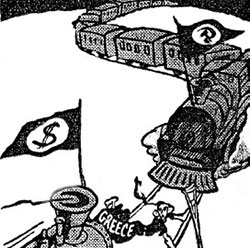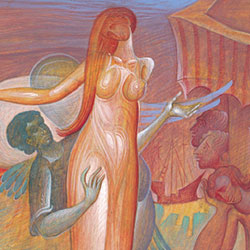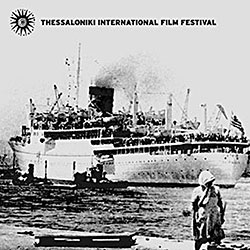MGSA@20
The 20th biannual MGSA symposium was a resounding success; both the number and quality of presentations exceeded prior symposia while the overall organization of the various activities was executed smoothly and without any major problems. A total of 209 individuals registered for the symposium, many of whom became MGSA members for the first time. MGSA membership is mandatory for symposium speakers.
The Symposium took place at the Omni Hotel in New Haven and was organized by the Hellenic Studies Program at Yale University with the support of the Local Arrangements Committee and local academics. The opening reception was held at Beinecke Rare Book and Manuscript Library on the Yale campus on the opening day of the symposium and was catered by Michael Psilakis, the award-winning chef of Anthos and Kefi restaurants in New York City.
The 20th symposium featured a number of cultural activities:
Exhibit "Reflections on America's Intervention in post-World War II Greece"

The exhibit, curated by John Iatrides, commemorated the 60th anniversary of the Truman Doctrine and the Marshall Plan, and focuses on the country's wartime devastation, the civil war, the Truman Doctrine, and the Marshall Plan and consists of photographs, documents, maps of military operations, books, pamphlets and other items relating to Greece in the late 1940s. Some of the materials on display are from the Harry S. Truman Library, the George C. Marshall Foundation, the Library of Congress and the Yale University Collection of Manuscripts and Archives.
See the MGSA Journal issue focussing on the Marshall Plan.
“George Seferis’ “Thrush” in Painting: An Exhibit by Artist George Kordis”
Mr. Kordis grew up in Athens and studied Theology at the Department of Theology of the University of Athens and Byzantine iconography. He continued his studies at the Theological School of "The Timios Stavros" in Boston (Master of Theology) and followed lessons in painting technique at "The School of Arts of The Museum of Boston" (1987-89). He specialized in both the theology and the aesthetics of Byzantine painting. In addition to his more traditional work, he has replicated in art what the great composers have done in music by deriving inspiration from the literary tradition of Greece. A preview of his Yale exhibit can be seen at the Program’s website at www.yale.edu/macmillan/hsp by clicking on the link “George Kordis Upcoming exhibit.”


Elly Paspala in Concert

In what must be one of the most memorable symposium events ever, Elly Paspala gave a truly impressive concert marking the ending of the 20th biannual symposium. A true child of the Greek-American diaspora, Ms. Paspala was born in New York where she studied at the Manhattan School of Music. She began her career singing in Astoria until she moved to Greece where she was discovered by Manos Hadjidakis. In 1982 she collaborated with the great composer on the album Pornography and subsequently on the masterpiece Ballads of Athena Street, and the very successful Laiki Agora and Romaiki Agora where she mostly reinterprets songs initially sung by Nana Mouskouri. Robust and lyrical at once, technically impeccable and emotionally elastic, her voice is without a doubt one of the most remarkable to have come out of Greece in the last twenty-five years. Though sparse in her album releases, she has carved a spot for herself in the Greek musical scene with the ground-breaking “Elly Paspala at the Music Hall” (1993) where she reinterprets Greek and foreign classics with the bravery and audacity that would make the most avant-garde of artists green with envy. She remains to this day the authoritative interpreter of Hadjidakis music and a tour de force on stage.
If you haven't heard her, here is a great rendition of Maroko on YouTube or a classic Hadjidakis.
“Immigration in Greek cinema (1956-2006)”

The retrospective, “Immigration in Greek cinema (1956-2006)” was the first ever thematic analysis presented at the Greek Section of the Thessaloniki International Film Festival and the first one to travel outside of Greece. Showcased were a wide range of short & feature-length films and documentaries. The retrospective aimed to provide a representative picture of the way Greek film-makers have approached the subject of immigration over the years. To date, these approaches have ranged from the so-called “old Greek” tales of rich Greek immigrants returning from America, immigrants’ attempts to integrate into contemporary Greek society, the condition of Greek immigrants in Europe, and the various Greek diasporas.